|
|
|
Sort Order |
|
|
|
Items / Page
|
|
|
|
|
|
|
| Srl | Item |
| 1 |
ID:
161868
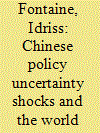

|
|
|
|
|
| Summary/Abstract |
How far could a rise in uncertainty affecting China be transmitted to other economies? This paper investigates the possible spillovers from a shock to Chinese Economic Policy Uncertainty (EPU) to developed (the United States, the Euro Area, Japan and South Korea) and emerging economies (Brazil and Russia). To take into account the non-linear nature of uncertainty shocks, we estimate a Smooth-Transition Vector Auto-Regressive (STVAR) model differentiating phases of expansion and phases of recession. We find important asymmetries in the responses to Chinese uncertainty shocks of macro-variables especially for the United States (US), the Euro Area (EA) and South Korea. Indeed, these countries display almost no response to the identified shock during booms. However, when hit in downturns, they suffer from a fall in industrial production, inflation and exports together with an increase in unemployment (except for Korea). Emerging countries (Brazil and Russia) stand out in the extent to which they significantly respond to the Chinese shock in both identified regimes. Lastly, the Japanese economy seems to be less sensitive to the Chinese shock.
|
|
|
|
|
|
|
|
|
|
|
|
|
|
|
|
| 2 |
ID:
149520
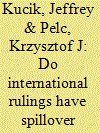

|
|
|
|
|
| Summary/Abstract |
How influential are international courts? Can their rulings reach beyond a given case and affect the behavior of countries not party to the dispute? International law is clear on the matter: rulings have no formal authority beyond the case at hand. This tenet is consistent with the incentives of sovereign states wary of delegating too much authority to courts. By contrast, the authors claim that even in the absence of formal authority, the rulings of international courts can affect behavior by mobilizing pro-compliance groups in countries not party to a dispute. They test these beliefs in the context of the World Trade Organization (WTO) through a novel approach. Because WTO rulings have implications for the fortunes of publicly traded firms, they examine whether financial markets bet on there being spillover effects beyond the case at hand. They rely on two quantitative case studies to test for a cross-border and a cross-industry spillover effect: can rulings have effects in countries and on industries other than those at issue in the initial dispute? The results suggest that the answer is a tentative yes. The spillover effects of international rulings may be a matter of scholarly contention, but their existence is something that financial markets appear willing to bet on.
|
|
|
|
|
|
|
|
|
|
|
|
|
|
|
|
| 3 |
ID:
181640


|
|
|
|
|
| Summary/Abstract |
European Defence is in a new and formative phase in which the European Union’s long list of defence acronyms has steadily grown. One of the most noticeable new policy initiatives is the European Commission’s European Defence Fund (EDF). This article consequently investigates and outlines the establishment of the European Defence Fund and the European Commission’s new role within the field of security and defence through the lens of revised neofunctionalism. This article thus asks how and through what steps did the EDF come about; and secondly how can neofunctionalism explain the dynamics involved in the establishment of the European Defence Fund. The analysis uses a process-tracing method and draws on interviews with relevant policymakers and officials in Brussels as well as official EU documents. The conclusions argue that the ever-increasing involvement of the European Commission in a policy field close to national sovereignty is starting to blur the traditional dichotomy between intergovernmental and supranational decision-making. In this way, this study contributes to the growing literature on the weakening of intergovernmentalism within the EU security and defence policy field.
|
|
|
|
|
|
|
|
|
|
|
|
|
|
|
|
| 4 |
ID:
165351
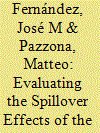

|
|
|
|
|
| Summary/Abstract |
The Colombian civil war lasted for nearly six decades with approximately 10 percent of its population being displaced over the same period. The implications of this conflict have transgressed international boundaries. Countries such as Ecuador experienced an exodus of victims as well as an increase in the presence of armed groups, along with the proliferation of illegal businesses. Even though the internal social and economic consequences of the Colombian conflict have been documented in the literature, there is yet to be a study addressing these issues from the perspective of impacted neighboring countries. In this work, we contribute to the literature by evaluating whether the influx of asylum seekers and the increasing presence of armed groups in the bordering provinces of Ecuador have lead to an increase in violence among these provinces. We do not find any link between the arrival of asylum seekers and the incidence of violent crimes in the Ecuadorean bordering provinces. Similarly, our results indicate that despite an increase in the presence of armed groups, these regions did not experience an increase in the homicide rates significantly different from the other provinces. The results are robust to various specifications and econometric techniques.
|
|
|
|
|
|
|
|
|
|
|
|
|
|
|
|
| 5 |
ID:
114083
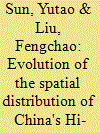

|
|
|
|
|
| Publication |
2012.
|
| Summary/Abstract |
Spatial distribution is an important dimension of research into the development of high technology (hi-tech) industries due to the knowledgeintensive features of these industries. This paper separates the agglomeration effects and the spillover effects, and analyzes the evolution of the spatial distribution of China's hi-tech sub-industries from themid-1990s by combining the geographic concentration index (locational Gini coefficient, concentration ratio) and spatial econometrics (Moran's I). The results reveal that, firstly, most hi-tech subindustries tend to be concentrated in the eastern coastal regions of China, while there are significant spillover effects from the eastern coastal regions to the central regions. The development model based on national hi-tech industrial zones is the primary reason for industrial agglomeration, and it is the result of both government direction andmarket rules. Secondly, on the macro-level, there has been a certain amount of geographical concentration and interregional division of labor among China's hi-tech industries, but there is low intraregional specialization. Furthermore, in contrast to the findings of most of previous studies, the distribution ofChina's hi-tech industries and that of its innovation capacity share similar evolutionary trends, although they do not completely overlap.
|
|
|
|
|
|
|
|
|
|
|
|
|
|
|
|
| 6 |
ID:
082932


|
|
|
|
|
| Publication |
2008.
|
| Summary/Abstract |
Although research on conflict has tended to separately study interstate conflict and civil war, states experiencing civil wars are substantially more likely to become involved in militarized disputes with other states. Scholars have typically focused on opportunistic attacks or diversionary wars to explain this domestic-international conflict nexus. The authors argue that international disputes that coincide with civil wars are more often directly tied to the issues surrounding the civil war and emphasize intervention, externalization, and unintended spillover effects from internal conflict as important sources of international friction. They empirically demonstrate that civil wars substantially increase the probability of disputes between states. An analysis of conflict narratives shows that the increased risk of interstate conflict associated with civil wars is primarily driven by states' efforts to affect the outcome of the civil war through strategies of intervention and externalization and not by an increase in conflicts over unrelated issues.
|
|
|
|
|
|
|
|
|
|
|
|
|
|
|
|
| 7 |
ID:
186950


|
|
|
|
|
| Summary/Abstract |
Will ports become less important in a post-industrial period dominated by service industries? This paper examines the impact and the spillover effects of ports on city economies. The results show that ports contribute to city economies primarily through producer and consumer services. To be specific, ports can drive the development of port-related producer services, and port spillover effects from other cities have a broader impact on producer services; the port contributes to the development of wholesale and retail trades in the local city but the boost to consumer services comes mainly from spillover effects from other ports. This paper concludes that ports are still shaping economic geography by influencing the service sector, and inter-city coordination mechanisms are suggested because of the spillover effects.
|
|
|
|
|
|
|
|
|
|
|
|
|
|
|
|
| 8 |
ID:
182746
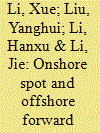

|
|
|
|
|
| Summary/Abstract |
This paper investigates the dynamic relationship between the onshore spot market and offshore forward market for Chinese currency around the period of China's “8.11” exchange rate regime reform, one of the most important market-oriented reforms implemented on August 11, 2015. We compare return and volatility spillover effects between the two markets before and after the “8.11” reform. The empirical evidence shows that a remarkable change has occurred in both the return and volatility spillovers. Before the reform, return and volatility spillovers exist from the offshore forward market to the onshore spot market. After the reform, however, we observe an obvious reverse in the direction and an increase in the strength of the return and volatility spillover effects. These findings suggest the existence of cross-market information flows, a change in the direction and a strengthening of the dynamic relationship after the reform. We argue that the “8.11” reform serves as a milestone reflecting long-term underlying forces that increase the relative importance of the onshore market.
|
|
|
|
|
|
|
|
|
|
|
|
|
|
|
|
| 9 |
ID:
113010


|
|
|
|
|
| Publication |
2012.
|
| Summary/Abstract |
The Pan Pearl River Delta (PPRD) Regional Co-operation Framework Agreement was signed in 2004. It aims to bring prosperity through partnership among nine Chinese Mainland provinces and China's two special administrative regions. In this paper, we use a dynamic panel data model to examine the economic growth of the PPRD economies from 1985 to 2009. Our analysis confirms the existence of regional growth spillover effects in the PPRD area. Our results also show that economic growth spillover effects of non-PPRD regions on the PPRD regions are greater than those among the PPRD members themselves. These findings imply that economic integration between Chinese provinces has generated considerable spillover effects on regional growth. However, the anticipated benefits of the implementation of the PPRD agreement have not been realized thus far. Therefore, greater effort should be made to promote further economic integration among these members so that their local economies can benefit from the positive spillover effects.
|
|
|
|
|
|
|
|
|
|
|
|
|
|
|
|
| 10 |
ID:
177783


|
|
|
|
|
| Summary/Abstract |
The international community often seeks to promote political reforms in recalcitrant states. Recently, some scholars have argued that, rather than helping, international law and advocacy create new problems because they have negative spillovers that increase rights violations. We review three mechanisms for such spillovers: backlash, trade-offs, and counteraction and concentrate on the last of these. Some researchers assert that governments sometimes “counteract” international human rights pressures by strategically substituting violations in adjacent areas that are either not targeted or are harder to monitor. However, most such research shows only that both outcomes correlate with an intervention—the targeted positively and the spillover negatively. The burden of proof, however, should be as rigorous as those for studies of first-order policy consequences. We show that these correlations by themselves are insufficient to demonstrate counteraction outside of the narrow case where the intervention is assumed to have no direct effect on the spillover, a situation akin to having a valid instrumental variable design. We revisit two prominent findings and show that the evidence for the counteraction claim is weak in both cases. The article contributes methodologically to the study of negative spillovers in general by proposing mediation and sensitivity analysis within an instrumental variables framework for assessing such arguments. It revisits important prior findings that claim negative consequences to human rights law and/or advocacy, and raises critical normative questions regarding how we empirically evaluate hypotheses about causal mechanisms.
|
|
|
|
|
|
|
|
|
|
|
|
|
|
|
|
| 11 |
ID:
192053
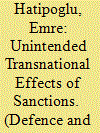

|
|
|
|
|
| Summary/Abstract |
The debate on unintended consequences of sanctions, such as their adverse effects on human rights, public health, or the economy beyond intended sectors in the target state, has become increasingly popular over the last couple of decades. Interestingly, however, this debate has mostly overlooked the transnational aspects of these unintended consequences. This study examines one such aspect, namely the economic spillover of sanctions to neighboring countries. Our global vector autoregression oil and inventory model (GOVAR) simulations on Indonesia, a medium-level oil producer, indicate sanctions may spill over to its neighbors’ domestic economy. The risk and nature of spillover varies with respect to the type of sanctions employed, timing of sanctions, and the macroeconomic indicator in the neighboring state in question. Equity markets appear especially susceptible to a contagion effect. Understanding how a sanction spills over to neighboring states can help sender states design sanctions that minimize regional disruptions.
|
|
|
|
|
|
|
|
|
|
|
|
|
|
|
|
|
|
|
|
|